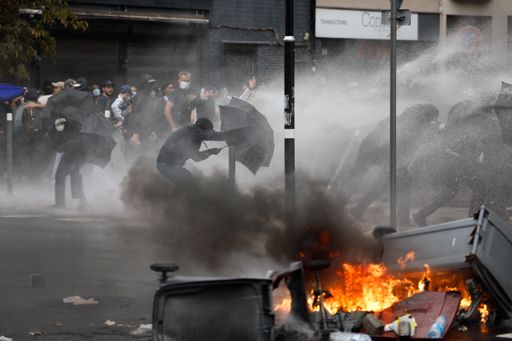France arrested 675 people nationwide during the September 10 “Block Everything” protests, with 280 detained in the Paris region alone, the French news broadcaster BFM TV reported on Thursday.
According to the Interior Ministry, of these arrests, 549 led to police custody following overnight incidents between Wednesday and Thursday.
Paris Police Chief Laurent Nunez reported that fresh arrests were made after clashes in the capital, particularly at Place des Fetes.
“This morning we have 280 arrests, including a large number of people in police custody,” he told CNews-Europe 1, adding that 164 remained in custody as of Thursday morning.
Nunez described the protest movement as “a failure,” noting that no major blockades materialised despite “numerous, numerous attempts.”
He cited around 10 failed attempts to block the Paris ring road, an unsuccessful effort to storm Gare du Nord railway station, and sporadic disruptions at high schools and bus depots.
Senate President Gerard Larcher also labelled the mobilisation “a failure” in remarks to BFMTV-RMC.
Some smaller protests continued on Thursday, including attempted blockades in Nantes and at Sciences Po university in Paris, where police intervened to restore access.
Unions have already called for a new day of nationwide protests on September 18, with a march planned in Paris. The final route has yet to be confirmed, as police have not approved the proposed endpoint.

Controversial national budget plan
The grassroots protest that started on social media urged citizens to "Block Everything" on September 10 to bring the country to a halt in opposition to former Prime Minister Francois Bayrou’s national budget plan.
Gaining momentum with the support of the France Unbowed (LFI) party, the movement originated with a small online group "Les Essentiels," saying: "On September 10, we stop everything, not to escape, to say no."
Meanwhile, French trade union organisations also called for a day of mobilisation across the country on September 18 to protest Bayrou's budget proposals.
France is facing mounting political tensions as Bayrou lost a confidence vote in the National Assembly on Monday.
Bayrou, who unveiled a 2026 budget framework in July, was seeking support for a plan to save nearly €44 billion ($51 billion) as part of efforts to reduce France’s soaring public debt, now at 113 percent of its GDP.
French President Emmanuel Macron appointed Armed Forces Minister Sebastien Lecornu as the country’s new prime minister on Tuesday. He has been tasked with holding consultations with political parties before forming his government.
France has one of the European Union's largest budget deficits at 5.8 percent of GDP.
Budget negotiations have been a major source of tension in French politics.
The failure to reach an agreement on the 2025 budget last year led to the collapse of the Michel Barnier government in December after left-wing and far-right parties united behind a no-confidence motion.




















